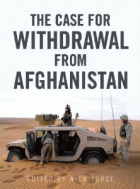Crimes of the Trump Era (a Preview)
The 25/8 News Cycle Is Already Rolling, But the Looting of America Hasn’t Really Begun
By Tom Engelhardt
It started in June 2015 with that Trump Tower escalator ride into the presidential race to the tune of Neil Young’s “Rockin’ in the Free World.” (“But there's a warnin' sign on the road ahead, there's a lot of people sayin' we'd be better off dead, don't feel like Satan, but I am to them...") In a sense the rockin’ has never stopped and by now the world, free or not, has been rocked indeed. No one, from Beijing to Mexico City, Baghdad to Berlin, London to Washington could question that.
Who today remembers that, in those initial moments of his campaign, Donald Trump was already focused on the size of his first (partially hired) crowd? (“This is beyond anybody’s expectations. There’s been no crowd like this...”) And he’s been consistently himself ever since -- less a strong man than a bizarrely high-strung one. In the process, while becoming president, he emerged as a media phenomenon of a sort we’ve never seen before.
First, it was those billions of dollars in advertising the media forked over gratis during the race for the Republican nomination by focusing on whatever he did, said, or tweeted, day after day, in a way that was new in our world. By the time he hit the campaign trail against Hillary Clinton, he was the ultimate audience magnet and the cameras and reporters were fused to him, so coverage only ballooned, as it did again during the transition months. Now, of course, his presidency is the story of the second -- each second of every day -- giving us two-plus weeks of coverage the likes of which are historically unique.
Think of it as the 25/8 news cycle. From that distant June to now, though it’s never stopped, somehow we have yet to truly come to grips with it. Never in the history of the media has a single figure -- one human being -- been able to focus the “news” in this way, making himself the essence of all reporting. He’s only been banished from the headlines and the screen for relatively brief periods, usually when Islamic terrorist groups or domestic “lone wolves” struck, as in San Bernardino, Paris, or Orlando, and, given his campaign, that worked no less well for his purposes than being the center of attention, as it will for his presidency.
The Never-Ending Presidency of Donald Trump (Has Barely Begun)
Nineteen months later, Trump's personality, statements, tweets, speeches, random thoughts, passing comments, complaints, gripes, and of course, actions are the center of everything. One man’s narcissism gains new meaning when inflated to a societal level. Yes, at certain moments -- the assassination of John F. Kennedy, O.J. Simpson’s white Bronco chase, the 9/11 attacks -- a single event or personality has overwhelmed everything else and taken the news by storm. But never has one person been able to do this through thick and thicker, through moments of actual news and moments when nothing whatsoever is happening to him.
As an example, consider the New York Times, the newspaper that both Donald Trump’s ascendant adviser Steve Bannon and I have been reading faithfully all these years. At the moment, Trump or people and events related to him monopolize its front page in a way that's beyond rare. He now regularly sweeps up four or five of its six or so top headlines daily, and a staggering six to ten full, often six-column pages of news coverage inside -- and that’s not even counting the editorial and op-ed pages, which these days are a riot of Trumpery.
Let’s face it: since 9/11 everything in our American world has been wildly out of proportion. Understandably enough, at the time that attack was experienced as something other than it was. In the heat of the moment, it would be compared to city-destroying or world-ending Hollywood disaster films (“It was like one of them Godzilla movies”), instantly dubbed “the Pearl Harbor of the twenty-first century,” or simply “A New Day of Infamy,” and experienced by many as nothing short of an apocalyptic event inflicted on this country, the equivalent of a nuclear attack -- as NBC’s Tom Brokaw said that day, “like a nuclear winter in lower Manhattan,” or as the Topeka Capital-Journal headlined it in a reference to a 1983 TV movie about nuclear Armageddon, “The Day After.” It was, of course, none of this. No imposing imperial challenger had struck the United States without warning, as Japan did on December 7, 1941, in what was essentially a declaration of war. It was anything but the nuclear strike for which the country had been mentally preparing since August 6, 1945 -- as, in the years after World War II, American newspapers regularly drew futuristic concentric circles of destruction around American cities and magazines offered visions of our country as a vaporized wasteland. And yet the remains of the World Trade Center were regularly referred to as “Ground Zero,” a term previously reserved for the spot where an atomic explosion had occurred. The 9/11 attacks were, in fact, mounted by the most modest of groups at an estimated cost of only $400,000 to $500,000 and committed by 19 hijackers using our own “weapons” (commercial airliners) against us.
However, the response from a Bush administration eager to strike in the Greater Middle East, especially against Iraq’s Saddam Hussein, was to act as if the country had indeed been hit by nuclear weapons and as if we were now at war with a new Nazi Germany or Soviet Union. In the process, Bush officials took that first natural urge to go apocalyptic, to see our country as endangered at an existential level, and ran with it. As a result, from September 12, 2001, on, the confusion, the inability to see things as they actually were, would never end. The Bush administration, of course, promptly launched its own “global war on terror.” (GWOT was the acronym.) Its officials then made that “global” quite real by insisting that they were planning to fight terrorism in a mind-boggling 60 or more countries around the planet.
Fifteen disastrous years later, having engaged in wars, occupations, or conflicts in at least seven countries in the Greater Middle East, having left failed or failing states littered in our path and spurred the spread of terror groups throughout that region and beyond, we now find ourselves in the age of Trump, and if it isn’t obvious to you that everything remains dangerously out of whack, it should be. Consider the set of former military men and associated figures the new president has appointed to run the national security state. As TomDispatch regular and professor of religious studies Ira Chernus points out today, they uniformly believe -- shades of GWOT -- that our country is in a literal “world war” at this very second, and they seem to believe as well that its fate and the planet's are at stake, even if none of them can quite decide whom it is we’re actually fighting. This struggle against, well, whomever, is so apocalyptic that, in their opinion, our very “Judeo-Christian” civilization is at stake. (Hence the recent Muslim ban, even if not quite called that.) On all of this, Chernus offers their own grim, whacked-out words as proof.
Who could deny that, by now, many Americans have lost the ability to see the world as it is, put much of anything in perspective, or sort out genuine threats from fantasy constructs? As a result, we’re led by delusional officials overseen, as if in some terrible Hollywood flick about the declining Roman Empire, by a mad, driven leader (who may be quite capable, in a matter of months, of turning the whole world against us). If you don’t believe me, just plunge into Chernus today and into a fantasy war and an apocalyptic fate that supposedly awaits us if we don’t fight to the death against... well...
Perspective, context, proportion? Sorry, we don’t grok you, Earthling. Tom
Field of Fright
The Terror Inside Trump’s White House
By Ira ChernusWhat kind of national security policy will the Trump administration pursue globally? On this issue, as on so many others, the incoming president has offered enough contradictory clues, tweets, and comments that the only definitive answer right now is: Who knows?
During his presidential campaign he more or less promised a non-interventionist foreign policy, even as he offered hints that his might be anything but. There was, of course, ISIS to destroy and he swore he would “bomb the shit out of them.” He would, he suggested, even consider using nuclear weapons in the Middle East. And as Dr. Seuss might have said, that was not all, oh no, that was not all. He has often warned of the dangers of a vague but fearsome “radical Islam” and insisted that “terrorists and their regional and worldwide networks must be eradicated from the face of the Earth, a mission we will carry out.” (And he’s already ordered his first special ops raid in Yemen, resulting in one dead American and evidently many dead civilians.)
And when it comes to enemies to smite, he’s hardly willing to stop there, not when, as he told CNN, “I think Islam hates us." He then refused to confine that hatred to “radical Islam,” given that, on the subject of the adherents of that religion, "it's very hard to define, it's very hard to separate. Because you don't know who's who."
[Note for TomDispatch Readers: As you may have noticed, in the era of Donald Trump and “alternative facts,” a wave of old dystopian novels headed by George Orwell’s 1984 has hit the bestseller list. It’s a striking phenomenon. At Dispatch Books, our own publishing line, we sensed that this might be coming and recently put out TomDispatch regular John Feffer’s stunning dystopian novel, Splinterlands. Unlike the older ones, from Sinclair Lewis’s It Can’t Happen Here to Aldous Huxley’s Brave New World, it reads as if you had stumbled upon the work of a journalist on a shattered planet in the very near future. If you’re in a dystopian mood, get yourself a copy as soon as possible (and lend us a little helping hand at the same time). Alternatively, if you go to the TomDispatch donation page and contribute $100 ($125 if you live outside the USA), Feffer will send you a signed, personalized copy of the book. Either way, it’s the perfect reading for our dystopian moment. Tom]
Last Friday, Donald Trump made his first visit to the Pentagon where he spoke of signing an order to begin “a great rebuilding of the armed services of the United States,” something he’s been advocating for quite a while. As TomDispatch regular Bill Hartung indicates today, this will mean a massive surge in federal dollars pouring into the abyss of the Pentagon, which has shown itself quite capable of absorbing such moneys in the past and seems to lack the slightest ability to account for what’s done with them. (The Pentagon has never even managed to pass an audit.) We already know that this will mean more troops, more ships, more planes, and as a draft executive order for the new president put it, “a desire to invest in a host of military capabilities, including Special Operations forces and nuclear weapons.”
These are two areas in which “build up” is already the operative phrase. At approximately 70,000 personnel, the elite Special Operations forces are now an enormous, secretive military -- larger than the armies of some sizable countries -- cocooned inside the regular armed forces. Special ops types are now dispatched annually to about 70% of the nations on the planet. As for those nuclear forces, under President Obama who won a Nobel Peace Prize in part for his abolitionist sentiments, they were already launched on a trillion dollar, three-decade “modernization” program, involving the creation of new delivery systems and “smart nukes” as well. If each of these forces is now to be expanded even more rapidly and expensively, that’s a genuine upping of the military ante on the planet.
As former Soviet leader Mikhail Gorbachev, who, with President Ronald Reagan, came remarkably close to negotiating nuclear weapons out of existence, pointed out recently in Time magazine, “it looks as if the world is preparing for war... Today,... the nuclear threat once again seems real. Relations between the great powers have been going from bad to worse for several years now. The advocates for arms build-up and the military-industrial complex are rubbing their hands.”
Indeed, at the dawn of the Trump era, it’s worth remembering that, despite the obvious power of the United States, this is no longer a one-way planet. Take the new “nationalism” of the president (and his close adviser Steve Bannon). As the guiding principle of American foreign policy, nationalism will prove a distinctly two-way street, as is already the case in Mexico where Trump’s wall, his immigration policies, and his tax threats against Mexican products may only stoke Mexican nationalism, uniting an otherwise riven country in a fierce spirit of anti-Americanism.
And don’t expect a staggering American military build-up to be a one-way phenomenon either, especially on the nuclear front. Before he’s done, Donald Trump, who has a yearning for the 1950s, could well put the planet on the kind of military footing that hasn’t been seen since at least the height of the Cold War. He could well spark a potentially out of control three-way arms race that would include China and Russia, while heightening increasingly pugnacious nationalist feelings across the planet. Worse yet, as Hartung points out today, if your money is going to head massively into the military (while civilian spending is slashed), when problems or crises arrive, as they will on such a planet, it’s obvious where you’re most likely to turn. At this point, only two weeks into his presidency, the Earth looks like a distinctly more dangerous place. No wonder the Bulletin of Atomic Scientists has just moved its Doomsday Clock 30 seconds "closer to catastrophe” at 2½ minutes to midnight. Tom
What Happens When All We Have Left Is The Pentagon?
Trump’s Vision of a Militarized America
By William D. HartungAt over $600 billion a year and counting, the Pentagon already receives significantly more than its fair share of federal funds. If President Donald Trump has his way, though, that will prove a sum for pikers and misers. He and his team are now promising that spending on defense and homeland security will increase dramatically in the years to come, even as domestic programs are slashed and entire civilian agencies shuttered.
The new administration is reportedly considering a plan -- modeled on proposals from the military-industrial-complex-backed Heritage Foundation -- that would cut a staggering $10.5 trillion in federal spending over the next decade. The Departments of Energy, Commerce, Transportation, and State might see their budgets slashed to the bone; the Corporation for Public Broadcasting would be privatized; and (though the money involved would amount to chicken feed) the National Endowments for the Arts and for the Humanities would be eliminated altogether. In the meantime, the ranks of the Army and Marines would be expanded, a huge naval buildup would be launched, and a new Star Wars-style missile defense system would be developed -- all at a combined cost of up to $1 trillion beyond the already munificent current Pentagon plans for that same decade.
What a strange moment. Everything, even the Super Bowl, is being Trumpified and is now divisive. Of course, the Super Bowl is always officially divisive with two rival teams and the fervent fans of each. Still, in a normal year, no matter which two teams are playing, the Super Bowl is also the great unifying event of the televised American year (other than, perhaps, the Academy Awards). More or less everyone watches, while consuming oceans of beer and enough chips and guacamole to fill a mid-sized city. It’s pure ritual all the way to the last minute of the fourth quarter. (As for me, when it comes to sports, I’m a New York hometown chauvinist. I lose interest once my city’s teams fall out of contention and yet -- like a zombie -- I still engage in a Super Bowl-watching ritual with friends.)
This year, however, as with everything else in this country, it’s going to be a Trumpian spectacle all the way. Like past presidents, The Donald will evidently not attend, but the New England Patriots are his team. (They play the Atlanta Falcons, if you happen to have been locked away in Guantánamo these last weeks.) Quarterback Tom Brady, coach Bill Belichick, and owner Robert Kraft have all backed Trump. Brady even had a red “Make America Great Again” hat in his locker. Trump hailed them at his campaign rallies, and he’s wished them well in Sunday’s game. (“‘In the audience, we have somebody that’s under no pressure whatsoever, because he’s got a great quarterback named Tom Brady, and a great coach named Belichick,’ Trump said [at a donor dinner in Washington], pointing to Kraft. ‘Your friend Tom just called, he feels good. He called to congratulate us... Good luck, you’re going to do great.’”)
And of course he bestowed perhaps the greatest honor of all on Brady, implicitly dissing him recently. No one, after all, can be allowed to stand taller than Donald J. Trump, which means that sooner or later even his allies have to be cut down to size and put in their place by him. Consider that a rule of Donaldland. In this case, during a rambling speech at CIA headquarters the day after his inauguration, he interrupted a riff about media “dishonesty,” itself an interruption of assurances that, despite media attempts to misreport his relations with the Intelligence Community, he was with the CIA “one thousand percent,” to take Brady down a notch in his own inimitable fashion: “So a reporter for Time magazine... and I have been on their cover 14 or 15 times. I think we have the all-time record in the history of Time magazine. Like if Tom Brady’s on the cover, it’s like one time because he’s won the Super Bowl or something, right? I’ve been on for 15 times this year. I don’t think that’s a record, Mike [assumedly National Security Adviser Michael Flynn], that can ever be broken. Do you agree with that? What do you think?”
What do you think? Fortunately, in such unnerving times, sportswriter Robert Lipsyte, TomDispatch’s jock culture correspondent, returns after an extended leave to offer us his memories of The Donald (whom he interviewed numerous times back when) and an assessment of how football has, at this curious moment, worked its way deep into the most unsettling parts of the American psyche. So get out those chips and that bowl of guacamole. It’s time to think Super Bowl, but in the context of an American world now being Trumpified. Tom
Football Is Trumpball Lite
Can Kaepernick Save Us?
By Robert LipsyteThe Super Bowl is superfluous this year. Who needs a reality show about violence, domination, and sexism, not to mention brain damage, now that we have Trumpball, actual reality that not only authenticates football’s authoritarianism but transforms us from bystanders into victims? Before this game is over, the players may swarm the grandstands and beat the hell out of us.
Pro football actually helped prepare us for the new president’s upset victory by normalizing a basic tenet of jock culture: anyone not on the team is an enemy, the Other. And it’s open season on opponents, the fans of opponents, critics, and women (unless they’re cheerleaders or moms). Trash talking is the lingua franca of this Trumpian moment, bullying the default tactic.
Yet pro football has also provided us with the single most vivid image of current American resistance to racism. Last summer, before a pre-season game, San Francisco 49ers quarterback Colin Kaepernick sat during the playing of the national anthem as a symbol of his refusal “to show pride in a flag for a country that oppresses black people and people of color.” As the season progressed, he started going down on his right knee when the anthem began, revealing that he was wearing black socks decorated with pigs in police hats. These, he said, represented “rogue cops that are allowed to hold positions in police departments.” He would eventually stop wearing them, convinced that the socks were a tactical mistake.
Kaepernick’s non-violent gestures, done initially without fanfare, were the most powerful message from SportsWorld since that other hard year of despair and determination, 1968, when two American Olympic medalists, Tommie Smith and John Carlos, raised their black-gloved fists in Mexico City.
We now find ourselves in Donald Trump’s back-to-the-future world. And why should we be surprised? His whole campaign pitch was to do it “again” -- to return to his dream of past American greatness, which seems mired in a 1950s America of burning fossil fuels and urban smog. In his very first days in office, through executive orders he’s already moved to revive two pipeline projects: the building of the Keystone XL pipeline from Canada to the Gulf Coast, cancelled by the Obama administration in 2015 after years of massive environmental protests, and the Dakota Access Pipeline, halted by the Obama administration late last year after fierce and effective protests by Native American tribes and others. At the same time, his administration has “frozen” all grants and contracts at the Environmental Protection Agency, a first step toward what will undoubtedly be an attempt to drag us back into an American past that lacked serious environmental protections. The president also took the first step -- another executive order -- toward rolling back (or simply rolling up) the Affordable Care Act. This was part of what will clearly be an attempt to quite literally roll back history by obliterating the “legacy” of the country’s first black president, including possibly bringing back CIA "black sites" and "enhanced interrogation techniques," both banned by Obama on entering the Oval Office. (Again, none of this should be surprising since Trump began his political career as the chief spokesman for birtherism, the initial attempt to delegitimize Obama's presidency.) And we await the new president’s announcement of his Supreme Court nominee to fill the empty seat of Antonin Scalia, knowing that at least one of his leading choices, a fierce opponent of both abortion and gay rights, would be ready to roll the clock back, in the case of Roe v. Wade, to the years before 1973, if not to the 1950s. Clearly, these are just initial steps on the road not to a genuine future but to what, by now, has become a kind of fantasy past.
And speaking of “again,” as TomDispatch regular Nomi Prins, author of All the Presidents' Bankers, points out today, there’s always Goldman Sachs, which is really a case of again and again and again. Who even remembers the campaign moments when Trump claimed that “the guys at Goldman Sachs... have total control over Hillary Clinton” and tweeted that she was “owned by Wall Street”? Now, The Donald has smashed all past records by appointing six Goldman Sachs alumni to posts in his administration. Think of that as again with a couple of exclamation points attached to it, a coup for an investment bank that has been a government powerhouse, as Prins makes so clear, since the 1930s. So buckle up, settle into that time machine, and head back to the future in an unprecedented way. Tom
The Goldman Sachs Effect
How a Bank Conquered Washington
By Nomi PrinsIrony isn’t a concept with which President Donald J. Trump is familiar. In his Inaugural Address, having nominated the wealthiest cabinet in American history, he proclaimed, “For too long, a small group in our nation's capital has reaped the rewards of government while the people have borne the cost. Washington flourished -- but the people did not share in its wealth.” Under Trump, an even smaller group will flourish -- in particular, a cadre of former Goldman Sachs executives. To put the matter bluntly, two of them (along with the Federal Reserve) are likely to control our economy and financial system in the years to come.
Infusing Washington with Goldman alums isn’t exactly an original idea. Three of the last four presidents, including The Donald, have handed the wheel of the U.S. economy to ex-Goldmanites. But in true Trumpian style, after attacking Hillary Clinton for her Goldman ties, he wasn’t satisfied to do just that. He had to do it bigger and better. Unlike Bill Clinton and George W. Bush, just a sole Goldman figure lording it over economic policy wasn’t enough for him. Only two would do.



















